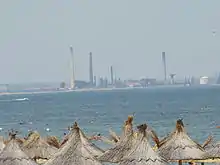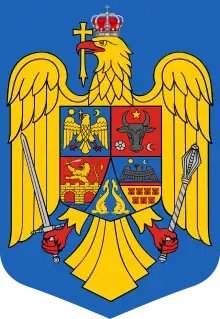Petrochemical industry in Romania
Romania was the largest European producer of oil in World War II. The oil extracted from Romania was essential for Axis military operations.[1][2] The petrochemical industry near Ploieşti was bombed heavily by American bombers (see Operation Tidal Wave). After the war, a heavy reconstruction and expansion was done under the communist regime. Since then, most of the industry has been privatized.

Possessing substantial oil refining capacities, Romania is particularly interested in the Central Asia-Europe pipelines and seeks to strengthen its relations with some Arab States of the Persian Gulf. With 10 refineries and an overall refining capacity of approximately 504,000 bbl/d (80,100 m3/d), Romania has the largest refining industry in the region. Romania's refining capacity far exceeds domestic demand for refined petroleum products, allowing the country to export a wide range of oil products and petrochemicals — such as lubricants, bitumen, and fertilizers — throughout the region.[3]
Refineries

This is an incomplete list of oil refineries in Romania:
- Arpechim Refinery, (Petrom/OMV), 70,000 bbl/d (11,000 m3/d)
- Astra Refinery, (Interagro), 20,000 bbl/d (3,200 m3/d)
- Petrobrazi Refinery, (Petrom/OMV), 90,000 bbl/d (14,000 m3/d)
- Petromidia Constanţa Refinery, (Rompetrol), 100,000 bbl/d (16,000 m3/d)
- Petrotel Lukoil Refinery, (LUKOIL), 68,000 bbl/d (10,800 m3/d)
- Petrolsub Suplacu de Barcău Refinery, (Petrom/OMV), 15,000 bbl/d (2,400 m3/d)
- RAFO Oneşti Refinery, (Calder A), 70,000 bbl/d (11,000 m3/d)
- Steaua Romană Câmpina Refinery, (Omnimpex Chemicals), 15,000 bbl/d (2,400 m3/d)
- Vega Ploieşti Refinery, (Rompetrol), 20,000 bbl/d (3,200 m3/d)
See also
1857 - First drilling of oil wells at Bend, northeast of Bucharest, on the Romanian side of the Carpathians; this year is registered as a beginning of Romania’s oil production. It was happened 11 years after the drilling of the first oil well in Baku (in Bibi-Heybat settlement) in 1846.
External links
- Romanian Petroleum History
- www.geohelp.net/world.html
- Mirbabayev Miryusif. Brief history of the first oil drilling wells in Baku region - "Noema" (Romania), 2018, v.XVII, p.175-185
- Vassiliou Marius. Historical dictionary of petroleum industry; 2nd edition - 2018, Lanham MD: Rowman and Littlefield-Scarecrow Press. p. 593
References
- "VIDEO Înregistrare senzaţională cu Hitler: "Fără petrolul din România nu aş fi atacat niciodată URSS-ul"".
- "A Zero Job! Shoveling Out Refuse from the Hot Pools of Oil That Comes up from a Spouting Well". World Digital Library. 1923. Retrieved 2013-05-30.
- http://www.gasandoil.com/goc/news/nte30277.htm Archived 2010-12-15 at the Wayback Machine Romania has the largest power sector in south-eastern Europe
